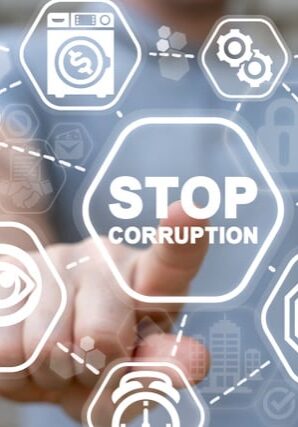
Emerging trends in ethics and compliance
The significant geo-political events of recent years have brought about many new challenges for ethics and compliance officers, sometimes making it hard to distill the main priorities. Based on our experience over recent months, founder and director Leo Martin selects six of the most pressing trends for ethics and compliance officers to take into account.
1. The rise of ESG reporting: this is continuing to evolve at pace and is becoming ever more sophisticated. In the past, ESG reporting was the preserve of corporate HQ, investor relations and communications teams, what we are now witnessing is a shift to the in-trays of ethics and compliance officers. As more ESG commitments are made, corporates will be pushed to provide verifiable assurances that these commitments and their supporting data are true. This, together with the rise in 'greenwashing', will become a key focus for compliance teams.
2. The prioritisation of human rights management is starting to have a real impact on corporate life, with a wave of legislation that requires a robust response, forcing all large organisations to start to take human rights topics seriously. In 2023 we anticipate a significant rise in the number of large corporates conducting meaningful human rights assessments of their operations and supply chains.
3. The EU Whistleblowing Directive is the latest in a greater push for corporate transparency, encouraging increased investments in better systems for raising concerns and protecting whistleblowers. Should this be appropriately extended to third parties, companies would be able to identify problems before they become serious. This is welcome and will drive improvements in corporate behaviour that will benefit societies more generally.
4. Efforts to combat tax evasion by the OECD are encouraging corporations to actively reduce aggressive tax avoidance, and we may see organisations refusing to work with companies legally domiciled in tax havens to avoid facilitating tax evasion. The register of beneficial ownership of property in the UK is another interesting example of the direction of travel. It is striking that immediate compliance is low, however the pressure will grow on opaque ownership structures to become more transparent.
5. The changing attitudes towards China and sanctions resulting from the war in Ukraine are driving rapid and complex changes in supply chains. These shifting global patterns are driving changes to supply chain locations and leading to new waves of investment in countries such as Indonesia, Vietnam and Mexico as well as some degree of on-shoring. As such, 2023 is likely to see significant supply chain disruption which may present new risks that would not previously have been foreseen.
6. The ubiquitous and ever-present topic of the climate and the rapid shift from fossil fuels towards renewable energies is impacting almost every sector, though some are feeling it more keenly than others. Businesses will be under intense scrutiny to understand their role in the energy transition and to report on it clearly and transparently. We expect to see more active concern from NGOs, employees and governments forcing change inside companies.

In our latest report, "How do organisations approach diversity, equity and inclusion?", we explore how businesses manage these issues and shed some light on emerging best practices. The report is based on findings from our survey which investigated selected organisational practices that contribute to the effective implementation of a diversity, equity and inclusion (DEI) strategy.
Developing a DEI approach, informed by the opinions of all staff (including the most critical ones), and embedding it into corporate strategy is crucial if the sustainable and competitive advantages that DEI can bring are to be achieved.
We focus on the significance of establishing goals for DEI metrics, the debate around the disclosure of DEI data, the importance of implementing efficient mechanisms for reporting concerns and offering effective training programmes, as well as the main challenges and prospects faced by businesses.
Changing human rights legislation

Evolving human rights legislation means that businesses are under growing pressure to identify and address their human rights risks.
Increasingly, companies are being held accountable for impacts throughout the length of their supply chains and mandated to undertake human rights due diligence across all of their operations. To meet requirements, companies need to review their existing policies and introduce mitigating measures.
In our latest blog, human rights analyst Yasmin Vidis Humphries outlines how companies can ensure they comply with the raft of emerging laws and meet international best practice. Her blog provides guidance on the steps needed to implement an effective strategy for reviewing and assessing human rights impacts, with advice on identifying risks and integrating human rights considerations into company procedures. This includes the development of a clear human rights due diligence programme as well as on-going monitoring.

Corruption can disrupt business operations with multiple negative consequences. A risk assessment to identify and prioritise the specific corruption risks a company faces is an essential first step in developing an effective anti-bribery programme.
In this blog senior consultant Viktor Soloviov outlines the steps needed to comply with international laws.

While legislation over the last decade has led to increasing demands for companies to have robust procedures in place to combat corruption, companies often struggle to properly embed the right practices into the business.
We explore the importance of having adequate procedures in place and detail the key steps to building an effective anti-corruption training programme.

In this two-part podcast (in French), senior consultant Lucie Bonpain and Anna Triponel, specialist in business and human rights, explore the links between human rights and climate change.
We discuss the risks and challenges businesses face, why this is a critical issue, the rights affected and proved guidance on how to develop practices to respect human rights and the climate.

With the increase in emerging human rights legislation, GoodCorporation’s first Business Ethics Debate of 2023 explored how companies should respond to emerging human rights legislation.
Bennett Freeman, an Associate Fellow of Chatham House, opened the debate by exploring the transition from voluntary to mandatory human rights due diligence.

